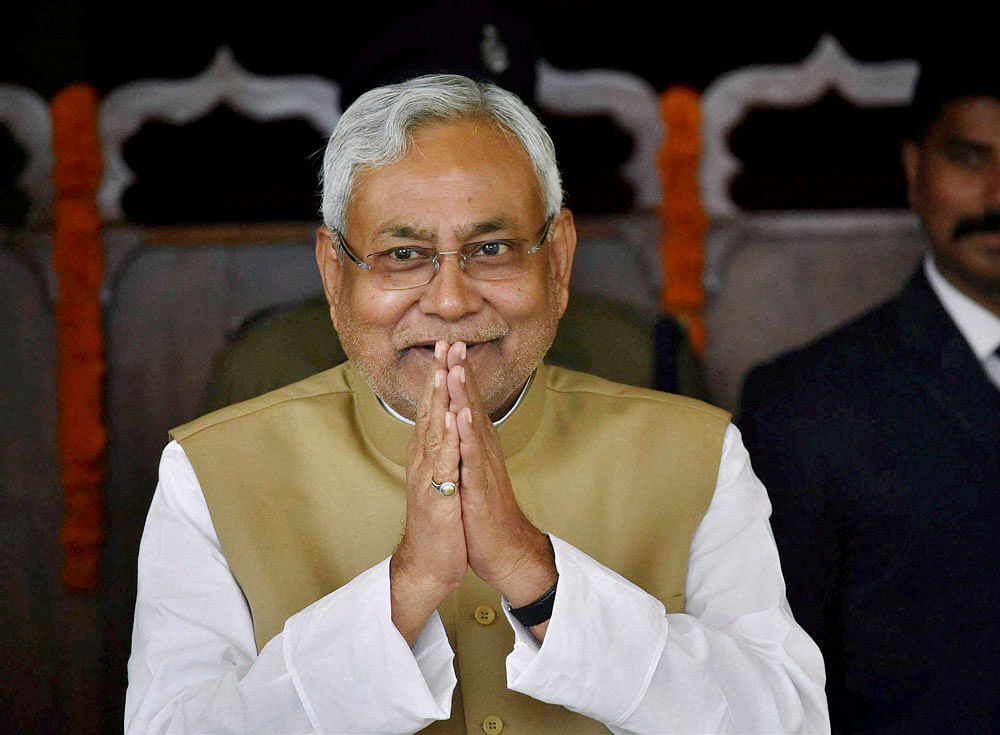
Bihar Chief Minister Nitish Kumar today said farm income is showing no signs of improvement even as he criticised farm loan waiver as a "regressive step" and found fault with the central government's crop insurance scheme.
Speaking at the fourth meeting of the Niti Aayog's governing council, he sought to replace the practice of cooking foods under the Mid Day Meal scheme with direct benefit transfer.
Kumar said farmers were not getting remunerative price for their produce and "farm income is showing no signs of improvement" which was a "major challenge" for the government.
His comments came amid talks of farm distress in various quarters, an issue which the Opposition has often used to target the BJP-led NDA government at the Centre.
The Bihar chief minister described the rise in the share of states in a pool of taxes to 42 per cent from 32 per cent merely a "compositional shift", saying the increase in revenue was negated to a large extent by a reduction in Centre's allocation for centrally-planned and sponsored schemes.
The Modi government has often cited its decision to raise the share of a state's revenue as recommended by the 14th finance commission as an evidence of its commitment to strengthening the power of states.
Kumar also batted strongly for the grant of special category status to Bihar, saying the state is far below the national average on multiple parameters of development.
The special status will increase its resources, improve access to external resources and act as a catalyst for private investment, he said.
Granting Bihar the special category status has been a longstanding demand of the JD(U) president which he has of late begun raising it vociferously after joining the ruling NDA last year.
The main agenda of the Niti Aayog's governing council meeting was to deliberate on measures taken to double farmers' income and the progress of government's flagship schemes.
Kumar, however, warned against farm loan waiver, which he said is being adopted as a measure to overcome this agriculture crisis, and asserted that experience indicates that it is a regressive step from a long-term perspective.
Several states, including many run by the BJP, have waived farm loans to placate distressed farmers and opposition parties have demanded the Centre do it across the country.
"This benefit is only limited to those farmers who have taken a loan. Non-loanee and non-raiyat farmers, who are in a large number, do not benefit from the scheme... I firmly believe that farmers should be given assistance through input subsidy. By doing so, we can reduce the total input cost of farmers and ensure higher actual returns," he said.
The Bihar government has recently launched this scheme, Kumar said and asked the Centre to provide it financial assistance.
Kumar had held the portfolio of agriculture ministry in the Atal Bihari Vajpayee government.
Sharing his views on 'Pradhan Mantri Fasal Bima Yojna', a key initiative of the government in the farm sector, Kumar said substantial numbers of farmers are not getting its benefits.
Insurance companies quoted excessive rates of premiums, he said, adding that it resulted in an average rate of premium for Bihar rising to 15 per cent for 'Kharif' produce in 2015-16 as against the scheme's provision of only 2.5 per cent.
The total amount of premium, including shares of the state, the Centre and farmers, was Rs 1122.50 crore but insurance companies paid only Rs 289.36 crore of compensation to farmers, he said.
"It is evident from the experience of implementing this scheme that non-loanee farmers and non-raiyat, whose number is substantial, are not getting the benefits of the scheme," he said.
The Bihar government has launched its own scheme considering these factors, he said, seeking 50 per cent central assistance under it.
The chief minister also spoke against the involvement of 'Anganwadi Centres' (AWC) in cooking food under the mid-day meal (MDA) scheme, saying its real objectives of enhancing the nutrition of pregnant and lactating mothers have been lost due to this.
On the other hand, the MDA has diverted the focus of teachers away from teaching, leading to poor learning outcomes, he said.
"Instead of the centre of learning, students see school as a centre of the food. Inadequate infrastructure in school results in poor storage and untrained lowly paid cooks results in the unhygienic management of food grains. This, in turn, contributes to poor quality of cooked meals," he said.
Unpleasant incidents keep happening when the cooked meal prepared in schools have led to children sometimes becoming sick for one reason or the other, leading to law and order situations, Kumar said, adding this was not good for the teaching environment in schools.
Time has come to begin experimenting with direct cash transfer and put trust and faith in beneficiaries' wisdom in spending the resources made available to them and for the purpose it is given to them, he said.
He also shared his government's preparation for the celebration of the 150th birth anniversary of Mahatma Gandhi and suggested an amnesty for those accused of petty crimes.
"Woman prisoners or prisoners above 60 years of age may be given the priority. lf suitable changes are required in the law, it may be considered," he said, stressing that India has a tradition of amnesty on special occasions.